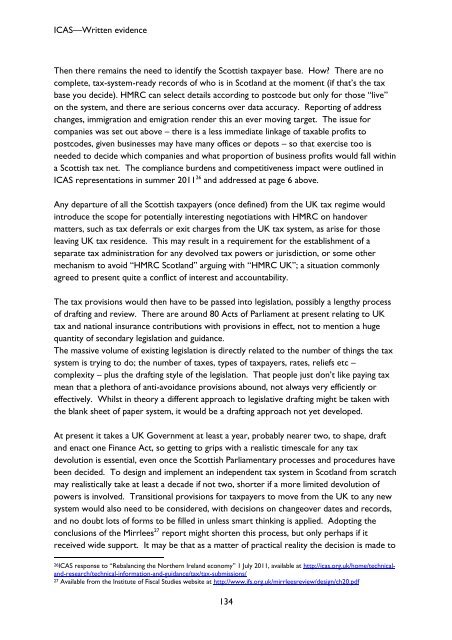SELECT COMMITTEE ON ECONOMIC AFFAIRS - Parliament
SELECT COMMITTEE ON ECONOMIC AFFAIRS - Parliament
SELECT COMMITTEE ON ECONOMIC AFFAIRS - Parliament
Create successful ePaper yourself
Turn your PDF publications into a flip-book with our unique Google optimized e-Paper software.
ICAS—Written evidence<br />
Then there remains the need to identify the Scottish taxpayer base. How? There are no<br />
complete, tax-system-ready records of who is in Scotland at the moment (if that’s the tax<br />
base you decide). HMRC can select details according to postcode but only for those “live”<br />
on the system, and there are serious concerns over data accuracy. Reporting of address<br />
changes, immigration and emigration render this an ever moving target. The issue for<br />
companies was set out above – there is a less immediate linkage of taxable profits to<br />
postcodes, given businesses may have many offices or depots – so that exercise too is<br />
needed to decide which companies and what proportion of business profits would fall within<br />
a Scottish tax net. The compliance burdens and competitiveness impact were outlined in<br />
ICAS representations in summer 2011 26 and addressed at page 6 above.<br />
Any departure of all the Scottish taxpayers (once defined) from the UK tax regime would<br />
introduce the scope for potentially interesting negotiations with HMRC on handover<br />
matters, such as tax deferrals or exit charges from the UK tax system, as arise for those<br />
leaving UK tax residence. This may result in a requirement for the establishment of a<br />
separate tax administration for any devolved tax powers or jurisdiction, or some other<br />
mechanism to avoid “HMRC Scotland” arguing with “HMRC UK”; a situation commonly<br />
agreed to present quite a conflict of interest and accountability.<br />
The tax provisions would then have to be passed into legislation, possibly a lengthy process<br />
of drafting and review. There are around 80 Acts of <strong>Parliament</strong> at present relating to UK<br />
tax and national insurance contributions with provisions in effect, not to mention a huge<br />
quantity of secondary legislation and guidance.<br />
The massive volume of existing legislation is directly related to the number of things the tax<br />
system is trying to do; the number of taxes, types of taxpayers, rates, reliefs etc –<br />
complexity – plus the drafting style of the legislation. That people just don’t like paying tax<br />
mean that a plethora of anti-avoidance provisions abound, not always very efficiently or<br />
effectively. Whilst in theory a different approach to legislative drafting might be taken with<br />
the blank sheet of paper system, it would be a drafting approach not yet developed.<br />
At present it takes a UK Government at least a year, probably nearer two, to shape, draft<br />
and enact one Finance Act, so getting to grips with a realistic timescale for any tax<br />
devolution is essential, even once the Scottish <strong>Parliament</strong>ary processes and procedures have<br />
been decided. To design and implement an independent tax system in Scotland from scratch<br />
may realistically take at least a decade if not two, shorter if a more limited devolution of<br />
powers is involved. Transitional provisions for taxpayers to move from the UK to any new<br />
system would also need to be considered, with decisions on changeover dates and records,<br />
and no doubt lots of forms to be filled in unless smart thinking is applied. Adopting the<br />
conclusions of the Mirrlees 27 report might shorten this process, but only perhaps if it<br />
received wide support. It may be that as a matter of practical reality the decision is made to<br />
26ICAS response to “Rebalancing the Northern Ireland economy” 1 July 2011, available at http://icas.org.uk/home/technicaland-research/technical-information-and-guidance/tax/tax-submissions/<br />
27 Available from the Institute of Fiscal Studies website at http://www.ifs.org.uk/mirrleesreview/design/ch20.pdf<br />
134

















